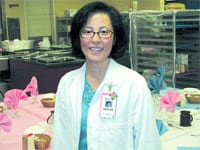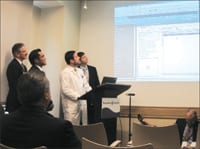Food as Medicine Mercy’s Clinical Nutrition Manager Serves Up Change
Young Hee Kim’s office is a room right off the Mercy Medical Center cafeteria. But she spends much more time around patients than she does around food.
Her recent work improving the diets of cardiac rehabilitation patients is one example. “You’d think with cardiac rehab, you’ve got to have the right diet, but that’s not always as intuitive as you might think,” said Kim, Mercy’s clinical nutrition manager.
Since arriving at Mercy 18 months ago from Baystate Medical Center, where she was a staff dietitian, Kim has made it her goal to match patients with the diet that will not only keep them nourished in the hospital, but will keep them out of the hospital once they return home.
“We’ve collected data from the clinically ill population, and there is a significant amount of data showing that early intervention improves patient outcomes,” Kim said. “By taking care of patients as well as we can nutritionally, we can prevent diseases, decrease length of stay, and solve a lot of problems.”
“A member of Young Hee’s department screens every patient admitted to Mercy for nutrition intervention needs, and the information and education she and her staff provide often support those patients once they return home,” echoed Dr. James E. Fanale, Mercy’s COO. “Her commitment to improving patient education is not only obvious to all who come in contact with her, it’s inspiring.”
Menu of Options
Kim’s role, as she describes it, is partly management and partly patient care. That being the case, she’s in a position not only to evaluate patient nutrition but also to recommend systemic changes. The major goal so far has been to move Mercy closer to the latest thinking — from both research and mandates from the Joint Commission of the Accreditation of Healthcare Organizations — on inpatient nutrition.
“There’s a big difference between nutritional care for a hospitalized patient and nutritional care for a patient who is ambulatory or well,” she said. “My number-one goal is to make sure patients are not malnourished or at risk for malnutrition.”
For a variety of reasons — a significant one being that recovering patients often don’t have much of an appetite — people staying in hospitals are more at risk for malnutrition than others. “You’re not allowed to eat anything before a test or surgery, you’re missing meals, and you don’t feel good,” Kim said.
“The rate of hospital-induced malnutrition doubles during the stay. I don’t think that’s very unusual, but we need to focus on correcting that problem. How do we do that? By providing food they enjoy eating, commercial nutritional supplements, and, for patients unable to eat, we may end up doing tube feeding.”
None of this is uncommon to any hospital, Kim said, but those that go about it diligently will end up with better patient outcomes — and fewer rehospitalizations, a key factor at a time when people are living longer with chronic illnesses.
“We also have a small role in teaching patients about their therapeutic diets, giving them some survival skills for when they go back home,” she said. Still, Kim knows a hospital, for someone just looking to get stable and go home, isn’t the best teaching environment.
That’s where Mercy’s outpatient clinic comes in, helping people with diabetes, renal failure, bowel disease, and a host of other conditions improve their health through good nutritional habits.
“We find out what the patient is doing at home and try to advise them on how to improve their diet, and change it so that it still fits with their lifestyle, but with a healthier focus,” she said. “We focus on small steps; you can’t make big changes all at once.”
Kim’s role also extends to educating colleagues, including physicians and nurses, on cutting-edge research on nutrition. She seeks ways to broaden her own perspective, such as her selection last year by the Nestle Nutrition Institute as a 2006 Nutrition Ambassador. The honor included a scholarship to attend the Nestle Clinical Nutrition Course in Switzerland last June, which showcased recent scientific advances in nutrition and opportunities to learn how to apply them in a clinical setting. “Nestle provided me with an incredible opportunity,” she said.
Coming Right Up
Since arriving at Mercy, Kim said, the hospital has made several changes based on past experience, examining what’s working and what’s not. In doing so, she has encountered a refreshing lack of bureaucratic obstacles when making recommendations.
“The great thing about Mercy is that we’re able to make changes quickly, and we don’t have a lot of red tape to go through,” she explained. “If we have data showing that one thing works and another thing doesn’t, there’s really nothing to prevent us from moving forward, unlike some larger institutions with committee after committee to go through.”
She said her outpatient work focuses by necessity on patients with chronic illness, not those simply overweight. But she recognizes that 60{06cf2b9696b159f874511d23dbc893eb1ac83014175ed30550cfff22781411e5} of Americans, by some estimates, are overweight or obese, and that can lead to chronic diseases of the heart, kidneys, and other parts of the body.
“People are coming to the realization that what we heard all those years ago is true: let your food be your medicine and your medicine be your food. You’ve got to have the right diet, not only to nourish your body, but for the prevention of chronic diseases.”



Comments are closed.